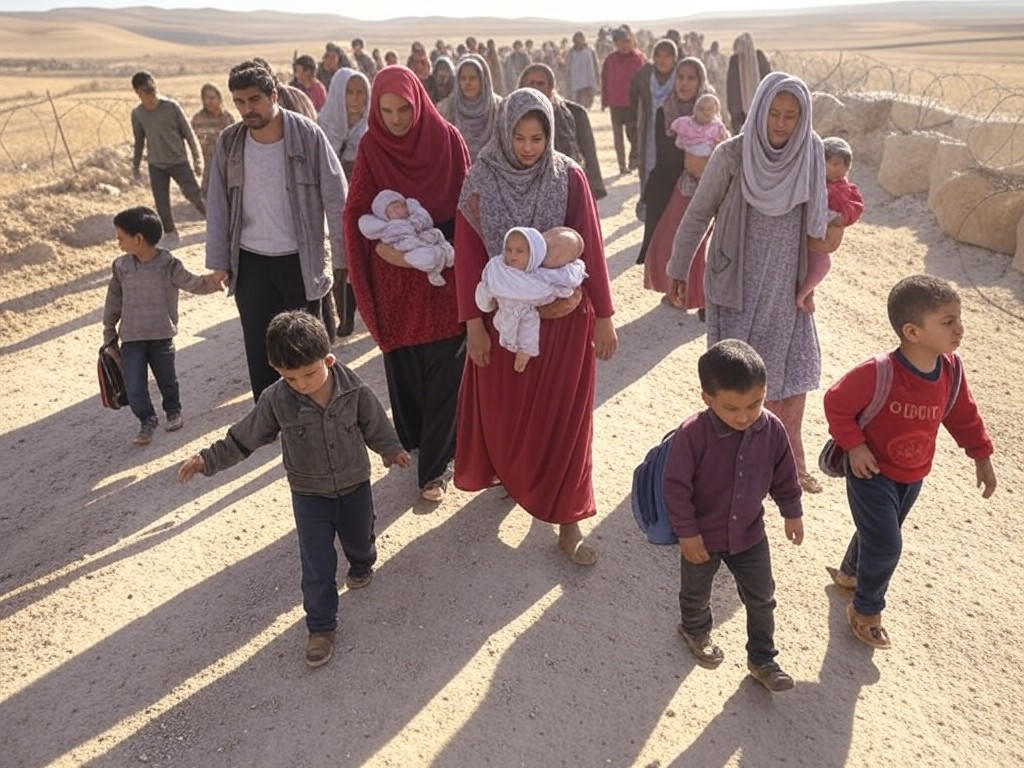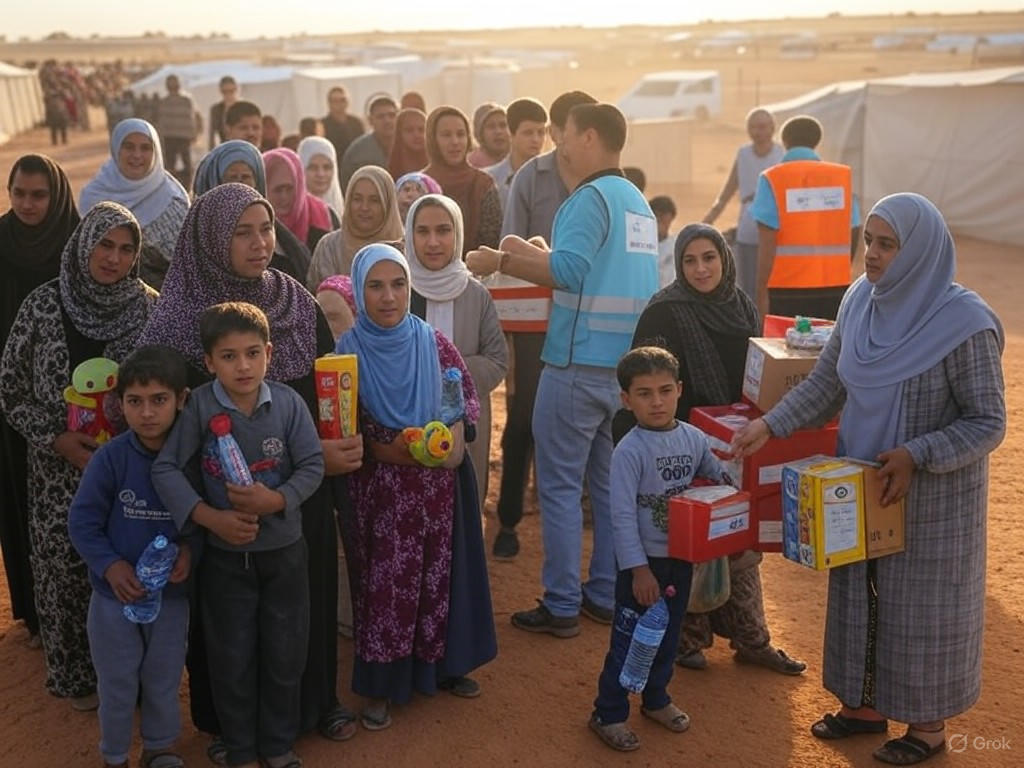Global Refugee Crisis: Syria’s Ongoing Exodus
In the shadow of Syria's protracted turmoil, millions have been uprooted, seeking refuge in an unforgiving world. As families flee the chaos of conflict, the ripple effects extend far beyond the Middle East, straining global aid systems and testing the resilience of nations. This humanitarian crisis, born from years of instability, underscores the urgent need for practical, coordinated responses that prioritize efficiency and self-reliance over expansive government interventions. From a center-right perspective, the path forward lies not in unchecked bureaucracy or endless subsidies, but in fostering free-market mechanisms and traditional values of community support to build lasting stability. As we examine the ongoing challenges, it becomes clear that strategic international cooperation can alleviate the burdens without overextending public resources.
The Syrian refugee crisis, which began in 2011 amid escalating civil strife, has displaced over 6.6 million people within the country and driven more than 6.7 million to seek asylum abroad, according to the United Nations Refugee Agency UNHCR report on Syria. These numbers represent not just statistics, but real lives—farmers, artisans, and families uprooted from their homes in a nation once known for its rich cultural tapestry. The migration has concentrated in neighboring countries like Turkey, Lebanon, and Jordan, where refugees now comprise a significant portion of the population. This influx places immense pressure on local economies and infrastructure, exacerbating issues like housing shortages and job scarcity. Yet, from a free-market standpoint, this strain highlights opportunities for innovation. Instead of relying solely on government-led aid programs, which often suffer from inefficiencies and delays, private enterprises and NGOs could step in to create job training initiatives and microloan programs. Such approaches would empower refugees to contribute to their host economies, fostering self-sufficiency rather than dependency.

Syrian families, carrying their belongings, make the perilous journey across the Turkish border, symbolizing the human cost of conflict and the resilience required for survival in exile.
The Strain on Global Aid Systems: A Case for Limited Government Intervention
At the heart of the crisis is the overburdened global aid framework, which struggles to keep pace with the demands of prolonged displacement. Humanitarian efforts, while well-intentioned, are often hampered by bloated bureaucracies and fragmented funding models. For instance, the United States and European nations have poured billions into aid, yet reports indicate that a significant portion is lost to administrative overheads and coordination failures. A Wall Street Journal analysis reveals that only about 60% of pledged funds from international donors reach frontline services, with the rest entangled in red tape. This inefficiency not only wastes resources but also undermines the very principles of fiscal responsibility that underpin free-market economies.
From a center-right lens, the solution lies in streamlining aid through public-private partnerships that leverage market forces. Traditional values of personal initiative and community solidarity can be harnessed by encouraging private philanthropy and corporate investments in refugee-hosting regions. For example, businesses could offer targeted vocational training programs, turning refugees into skilled workers who bolster local industries. This approach aligns with limited government intervention, where the state's role is confined to facilitating frameworks rather than dictating outcomes. In the Middle East, countries like Jordan have seen modest success with such models, where foreign investments in agriculture and manufacturing have absorbed refugee labor, reducing reliance on handouts.
The broader migration patterns fueled by the Syrian crisis further complicate global dynamics. As refugees seek opportunities in Europe and beyond, host nations grapple with integration challenges that strain social services and cultural norms. A Brookings Institution study estimates that the economic cost to Europe alone exceeds $20 billion annually, largely due to unplanned migration flows. Here, advocates of free markets would argue for policies that emphasize merit-based migration and private sponsorship programs, allowing individuals to sponsor refugees through community networks. This not only preserves traditional values of hospitality and mutual aid but also ensures that newcomers contribute productively, rather than becoming a fiscal burden.
Evidence of Ineffective Aid and Pathways to Reform
Empirical evidence underscores the pitfalls of over-reliance on government-centric aid. In Syria's neighboring regions, where refugees have overwhelmed local systems, studies show that cash-transfer programs managed by international organizations often fall short. The World Bank report on Middle East migration highlights that while direct aid provides short-term relief, it fails to address long-term economic integration. For instance, in Lebanon, where over 1.5 million Syrian refugees reside, unemployment rates have soared, illustrating how unchecked aid without market integration exacerbates instability.
Contrast this with successful models of limited intervention. In Turkey, private sector initiatives have created job opportunities in manufacturing hubs, demonstrating how free-market principles can mitigate humanitarian crises. A Financial Times article details how Turkish businesses, supported by international loans, have employed thousands of refugees, turning potential economic drains into assets. This evidence supports the center-right view that empowering individuals through enterprise, rather than expansive welfare systems, leads to more sustainable outcomes. By prioritizing traditional values like hard work and self-reliance, these efforts not only aid refugees but also strengthen the host economies.

Volunteers and local organizers distribute essential supplies in a Jordanian camp, showcasing the role of community-driven efforts in providing immediate relief amidst the ongoing humanitarian crisis.
Conclusion: Toward a Balanced, Resilient Future
As the Syrian refugee crisis enters its second decade, the world must move beyond reactive measures to embrace coordinated, efficient support that honors free-market ingenuity and traditional values. By advocating for public-private collaborations, streamlined aid, and policies that promote self-sufficiency, we can alleviate the strains on global systems without succumbing to the pitfalls of overreaching government control. This approach not only addresses the immediate needs of those affected but also fosters a sense of hope and resilience, reminding us that true progress stems from individual initiative and community spirit.
In the end, the Syrian people—marked by their enduring strength—deserve solutions that empower rather than entangle. As nations in the Middle East and beyond recommit to this vision, the potential for a more stable, prosperous future becomes attainable. Let us, then, channel our efforts toward practical, market-oriented strategies that uphold the dignity of all involved, ensuring that the lessons of this crisis pave the way for enduring peace.

